- Home
- Roddy Doyle
Charlie Savage
Charlie Savage Read online
Contents
Cover
About the Author
Also by Roddy Doyle
Dedication
Title Page
1
2
3
4
5
6
7
8
9
10
11
12
13
14
15
16
17
18
19
20
21
22
23
24
25
26
27
28
29
30
31
32
33
34
35
36
37
38
39
40
41
42
43
44
45
46
47
48
49
50
51
52
Acknowledgements
Copyright
About the Author
Roddy Doyle was born in Dublin in 1958. He is the author of thirteen acclaimed novels including The Commitments, The Snapper, The Van and Smile, two collections of short stories, and Rory & Ita, a memoir about his parents. He won the Booker Prize in 1993 for Paddy Clarke Ha Ha Ha.
ALSO BY RODDY DOYLE
Fiction
The Commitments
The Snapper
The Van
Paddy Clarke Ha Ha Ha
The Woman Who Walked Into Doors
A Star Called Henry
Oh, Play That Thing
Paula Spencer
The Deportees
The Dead Republic
Bullfighting
Two Pints
The Guts
Two More Pints
Smile
Non-Fiction
Rory & Ita
Plays
The Snapper
Brownbread
War
Guess Who’s Coming for the Dinner
The Woman Who Walked Into Doors
The Government Inspector (translation)
Two Pints
For Children
The Giggler Treatment
Rover Saves Christmas
The Meanwhile Adventures
Wilderness
Her Mother’s Face
A Greyhound of a Girl
Brilliant
Rover and the Big Fat Baby
For Ronnie Caraher
1
One of the grandkids wants a tattoo.
–He’s only three, I tell the wife.
–I’m aware of that, she tells me back. –But he still wants one.
–He can’t even say ‘tattoo’, I tell her.
–I know.
–‘Hattoo’ is what he says.
–I know, she says. –It’s sweet.
And she’s right. Normally, I don’t have much room for the word ‘sweet’. If I hear of an adult being described as sweet, I’m off for the hills and I stay up there till they’re gone. ‘Sweet’ is just a different word for ‘mad’, ‘boring’, or ‘nearly dead’, and often it’s all three. But kids – little kids – that’s different. Especially if they’re your own. Only if they’re your own. No man really cares about other people’s kids or grandkids.
Anyway.
–What sort of a present is a tattoo? I ask the wife.
–He has his heart set on one, she says.
Those words terrify me. I once ended up in Wales on Christmas Eve, looking for a Tamagotchi. Dublin was full of the things but the daughter’s heart was set on a pink one. And Wales, as everyone knows, is the home of the pink Tamagotchis. They breed there, or something.
Then there was the wife’s sister’s husband. He wanted us all to walk across the Sahara with him for his fiftieth birthday.
–Will Dollymount not do him? I said. –There’s loads of sand and the pint’s better.
–He has his heart set on it, said the wife. –And he doesn’t drink.
–He’ll regret that when he’s halfway across the fuckin’ Sahara, I said.
–You’re gas, she said.
And she booked the tickets, Easyjet to Casablanca. But then, thank Christ, they split up, him and the wife’s sister, just before his birthday and he had to go on his own. The last we heard – an Instagram message to one of their kids – he was after joining up with ISIS. But I’m betting they threw him out for being such a pain in the hole.
Anyway. This was different. This was way more complicated than the boat to Holyhead or a plane to Morocco.
–A tattoo, but, I say. –Santy doesn’t deliver tattoos, does he?
There’s no way I’m letting Santy down the chimney with needles and ink, even if he brings all the sterilisation equipment and a team of elves with verifiable first-aid experience.
–Well, says the wife. –He’s after writing the letter.
–He can’t write, but, I say. –He’s only three.
–He dictated it, she says.
–And it’s gone into the postbox?
–Yep.
–Could we not persuade him to change his mind? I ask her. –He could dictate a new letter. ‘Dear Santy, on second thoughts, I’d much prefer a scooter.’ And what gobshite brought him to the postbox?
She doesn’t even stare at me. She just walks out of the kitchen.
–Well, that’s helpful, I call after her.
I don’t often have good ideas, those light-bulb ones that go off in your head. But now I have two on the trot. And I run after the wife with the first one. This is two days after she walked out – but that’s a different story.
–Typhoid Mary, I say.
–What about her?
Mary lives next door. She was there before we moved in. She was probably there before the houses were built.
Anyway.
–You know that tattoo she has between her shoulder blades? I say. –The seagull.
–It’s down near her arse, she corrects me.
–Exactly, I say. –But it was up on her shoulders when she got it done thirty years ago.
–So, says the wife.
And I can tell; she’s enjoying this.
–You want to traumatise the poor child by bringing Mary in and making him look at her migrating tattoo – and it’s not a seagull, by the way, it’s a butterfly. You want Mary to get up out of her wheelchair and turn around and—
–Okay, I say. –Forget it.
And I’m turning away, all set to emigrate, when the second idea slaps me.
–I’ll do it, I tell her.
–Do what? she says.
–Get the tattoo, I say.
–Go on, she says.
–Well, I explain. –Santy writes back. No problem with the tattoo but you’re too young. So we’ll put it on your grandad and he can mind it for you and you can look at it any time you want, till you’re old enough to have it yourself, on your arm or whatever.
–His chest, she says.
And she’s looking at me with – well, it’s not admiration, exactly. But it’s like she’s opened an empty tin of biscuits and discovered there’s one left.
So, that’s Christmas Eve sorted. I’m heading to a tattoo parlour in town – the daughter says she knows a good one for older people, called Wandering Skin, but I think she might be messing – and I’ll be coming home with SpongeBob SquarePants hiding under my shirt.
2
I’m having a slow pint with my buddy.
The grandson has had me plagu
ed all day, wanting to check on his SpongeBob tattoo. My fingers are raw from doing and undoing the buttons of my shirt. What happened was, I’d had to have the hair shaved off my chest when I was getting the tattoo done on Christmas Eve, and the hair has started to grow back. It’s grey, like, and it made SpongeBob look like he’d died in the night. The poor kid cried when he saw it and he told his mammy – my daughter – that I’d murdered SpongeBob.
–G’anda ’urder ’PungeBob!
–I didn’t touch SpongeBob, I said.
The women looked at me like I was Jimmy Savile, so now I’m having to shave my chest twice a day. I’m standing in front of the mirror, and I’ve cut myself twice already – poor oul’ SpongeBob is bleeding to death. I’m half-thinking of carving him out and just giving him to the child in a plastic bag, when the text arrives.
Pint?
So here we are.
–I’ve made a new year’s resolution, my buddy tells me.
This is unusual. We don’t go in for that kind of shite – resolutions and birthdays and that. So something’s up. I’m beginning to wish I was back in the bathroom skinning SpongeBob.
–A resolution? I say.
–Yeah, he says. –I’ve decided. From now on, I’m going to be honest.
I know he’s looking at me, but I’m staring at my pint. He’s going to say something – I know he is – something embarrassing or sad. He’s my friend and all but I’m hoping to Christ he sticks to the football.
But he doesn’t.
–I identify as a woman, he says.
And now I look at him. He’s sixty or so, same as myself.
–But, I say. –Like – you’re a man.
–I know, he says.
–You’re dressed the same as always.
–I know.
–You’re drinking a pint.
–I know.
–And you’re telling me you’re a woman?
–I didn’t say that, he says. –I said I identify as a woman.
I’m not as shocked as I think I probably should be – and that, in itself, is a bit of a shock. I think my buddy here is after telling me he wishes he was a woman. But I don’t seem to care that much. I’m tempted to pat him on the back but I’m worried I’ll feel a bra strap under his hoodie.
Anyway.
–What’s it mean? I ask him. –Exactly – that you identify as a woman.
We’re not shouting, by the way. This is a very quiet conversation.
–I’m not sure, he says. –But I heard it on the radio and I just thought to myself, ‘That’s me.’ It felt right.
–And tell us, I say. –Are you a lesbian?
–What?
–Cos it would probably be handier if you were.
–How would it? he asks.
–When we talk about women.
–We never talk about women.
–If we did, I say. –If a good-looking woman walked in now, say. We could both agree on that. It’d be nice.
He shrugs – exactly the same way he’s been shrugging for the twenty–five years I’ve known him. He tells me not to tell anyone and I promise him I won’t. But I tell the wife. I’m a bit lost, and in need of a bit of guidance.
–A good buddy of mine says he identifies as a woman, I tell her.
–Which one? the wife asks me.
–He wishes to remain anonymous, I say.
–Is it –?
And she names him.
–Good Jesus, I say. –How did you know?
–Ah, well, she says, and then the grandson comes in, wanting to assess SpongeBob. So that’s that until later, when we’re up in the bed.
The wife has a theory. His wife – my pal’s wife, like – died a while back, three years or so. Maybe more – I don’t trust myself with time any more. Anyway, she says – my wife – that he misses her.
–Yeah, I agree. –That’s true.
–And maybe he misses her more than he’d miss himself, she says.
–D’you think?
–It’s just a theory, she says.
When she says that – and she says it a good bit, especially since she did that Open University yoke a few years back. But when she says it – it’s just a theory – you know it isn’t just anything. It’s gospel.
–Fair enough, I say. –That makes sense – sort of. But why’s he after telling me?
–Well, you’re his friend, she says. –You should be pleased.
And I am. And a bit sad. And – I don’t tell her this – a bit excited.
–What about you? she says.
She shifts in the bed and I know there’s a big question coming.
–If I go before you, will you identify as a woman?
I keep staring at my book.
–I’d like a sports question, please.
3
I’m heading into town with the daughter. Normally, this would be grand. We’d have a wander and a laugh and maybe a drink on the way home. But this is different. I have to buy clothes. The wife used to come with me but she slapped an embargo on it the last time, about two years ago – maybe three years.
–Never again, she said, when I told her that the shirt she’d said was perfect made me look like Mary Tyler Moore. I’d forgotten all about that. But she hasn’t. It was what she called the second-last straw.
Anyway.
I hate clothes.
I could look at a jumper for days and still not know if it’s the one for me – or even if it’s definitely a jumper. So the daughter has agreed to come with me.
–Grand, so, she says. –I’ll be your fashion consultant.
–I’m only buying a pair of jeans and a couple of shirts, I tell her.
–There’s no such word as ‘only’, Dad, she says. – Not in the world of high fashion. Think ‘big’, think ‘statement’.
But I think ‘Good’, I think ‘Jesus’, and I think I’ll go hide in the attic till she’s forgotten all about it.
But I catch her looking at me.
–What?
–I’m looking at your eyes, she says.
–Why?
–We start with the eyes, like, and build from there, she says.
–My eyes don’t wear trousers, love, I tell her.
But she’s not listening. She’s taking a photograph – before I know what she’s doing – and she fires it off to her friends.
–Why?
–To find out what colour your eyes are, she says. –They’re brown, I tell her. –I think. At least, they used to be.
Her phone starts pinging and she’s reading out her messages.
–Megan says yellow, Sally says puke green and Mark says you must have been a ride before the Famine.
–Mark?
–D’you want his number?
–Ah, here, I say, and I text my pal, the Secret Woman.
Pint?
So here we are.
–I have to buy new clothes, I tell him.
–Hate that, he says.
–I was hoping you’d come into town with me, I say. –Give me a hand.
–No way, he says. –You’re on your own.
I look at him now; I actually stare at him.
–I thought you identified as a woman, I say.
–Yeah, he says. –A woman with enough cop-on never to go shopping for clothes with a colour-blind oul’ fella.
–Who says I’m colour-blind?
–Look at your jumper, he says. –Look at your shirt. Clash, clash, clash.
He’s hopeless, no good to me. So I’m stuck with the daughter and I’m terrified. Saying no to the wife is easy; it’s a big part of the gig. But the daughter – I could never say no to the daughter.
She brings us into the place that used to be Roche’s Stores and I think I’m on safe enough ground. But then – Christ – she gets me to put on a pair of trousers and I don’t think they’re trousers at all.
She shakes the changing-room curtain.
–Are you alright in there?
�
�I don’t think these are meant for a man, love, I say. –I think they’re for a big girl. There’s no zip.
–It’s at the side, like.
–It’s no good to me there, love, I tell her. –Can I not just have a pair of Wranglers?
–Try this, she says, and she hands in some sort of a one-sleeved jacket.
I want to cry – I nearly do. She’s not going to let me out of the changing room unless I commit to becoming a cartoon. I’m thinking of digging a tunnel when she hands me in something that’s almost definitely a shirt. It has a collar and all. I try it on and I show her.
–Blue’s your colour, Dad, she says.
–Can we go home now, please? I ask her.
But she’s only starting. For the next three hours – I think it’s hours but it might be days, or weeks – I stop having opinions and a personality and I just surrender. I only put the foot down when she thinks she’s deciding which pub we’ll be going to on the way home.
So we’re sitting in the Flowing Tide and I’m looking at her over all my shopping bags. I like a pint, I rarely need a pint – but I need the one in front of me now. I’m exhausted, and relieved – a bit hysterical; it must have been like this for the lads coming home from Vietnam. And I admit it, I’m kind of looking forward to getting into the new gear. I smile at her as I pick up my pint, and she says it.
–I’m proud of you, Dad. You’re a real metrosexual.
I put the glass down.
–I’m a what?
4
I’m only putting the pint to my lips when the text goes off in my pocket. It’s the daughter. The grandson wants to say night-night to SpongeBob. I look at the text, I look at the pint. I’ll send her a photo. I’ll unbutton the new shirt, do a SpongeBob selfie, and fire it back to her to show the kid before she tucks him in.
One of the sons showed me how to do that – send a photograph on your phone – when he was sending a picture of his dislocated kneecap to his girlfriend in the Philippines – because she’s a nurse, he said.
–Is she on her holidays over there? I asked him.
–No.
–Does she live there?
–Yeah.
–Come here, I said. –Have you actually met the girl?
–No, he said. –Not really.
I tried not to sound too taken aback.
–And she’s your fuckin’ girlfriend?
He muttered something.
–What?
–One of them, he said.
–And do any of your other girlfriends actually live in Dublin? I asked him.

 The Van
The Van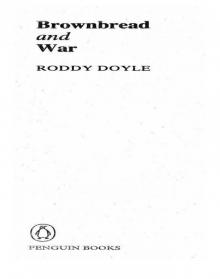 Brownbread & War
Brownbread & War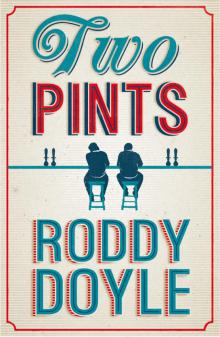 Two Pints: A Collection
Two Pints: A Collection Rover and the Big Fat Baby (Giggler 4)
Rover and the Big Fat Baby (Giggler 4) The Dead Republic
The Dead Republic Paddy Clarke Ha Ha Ha
Paddy Clarke Ha Ha Ha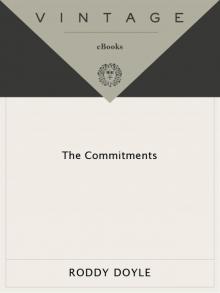 The Commitments
The Commitments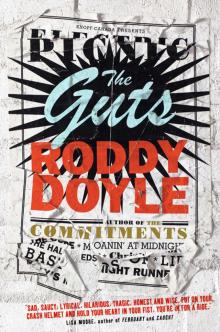 The Guts
The Guts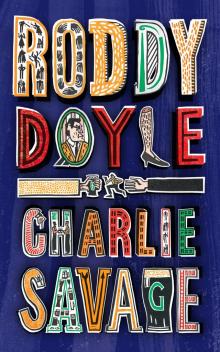 Charlie Savage
Charlie Savage A Star Called Henry
A Star Called Henry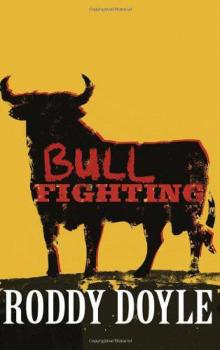 Bullfighting: Stories
Bullfighting: Stories Two More Pints
Two More Pints The Snapper
The Snapper Oh, Play That Thing
Oh, Play That Thing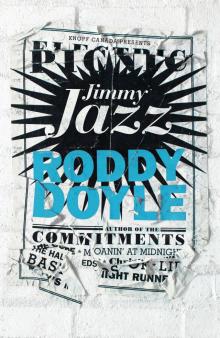 Jimmy Jazz
Jimmy Jazz Paula Spencer
Paula Spencer Wilderness
Wilderness The Woman Who Walked Into Doors
The Woman Who Walked Into Doors The Deportees
The Deportees Rover and the Big Fat Baby
Rover and the Big Fat Baby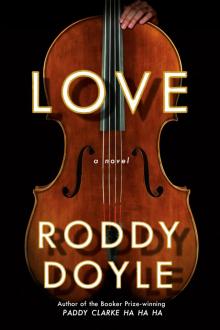 Love
Love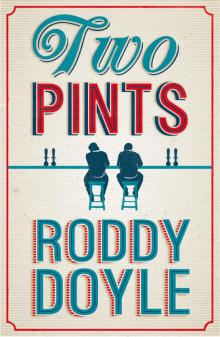 Two Pints
Two Pints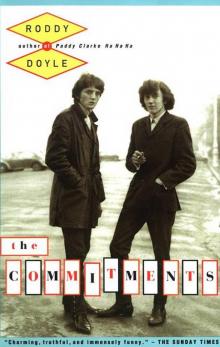 The Commitments b-1
The Commitments b-1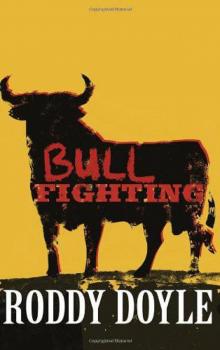 Bullfighting
Bullfighting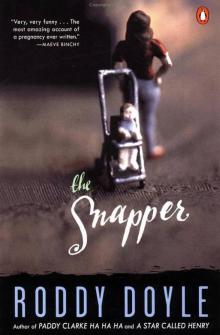 The Snapper b-2
The Snapper b-2